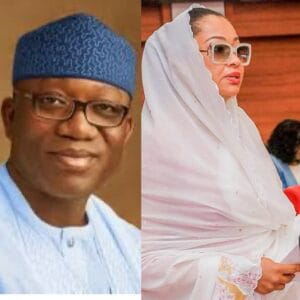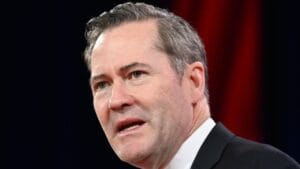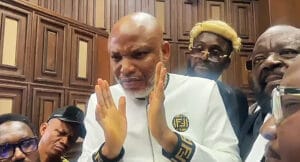On Tuesday, the Federal High Court in Abuja dismissed charges against 119 #EndBadGovernance protesters.
These protesters had been brought to court on Friday, November 1, facing serious charges. The charges included treasonable felony, intent to destabilize Nigeria, and incitement to mutiny, with accusations of encouraging the military to take control from President Bola Tinubu’s administration.
The protesters were divided into two groups for their initial court appearance. The first group included 76 individuals, with 32 being minors. The second group contained 43 protesters.
During Tuesday’s court session, M. D. Abubakar, representing the Attorney General of the Federation (AGF) and speaking for the Federal Ministry of Justice, announced that the Federal Government intended to take control of the case and ultimately dismiss it. Abubakar cited Section 174 of the 1999 Constitution, which empowers the AGF to assume control of any legal case from the Inspector General of Police.
“We have an application to take over and discontinue this case under Section 174 of the constitution,” Abubakar said, addressing the court.
The defense did not challenge the AGF’s request. Senior Advocate Femi Falana, representing the defense, expressed support, stating, “We have no objection to the application, as it aligns with the Administration of Criminal Justice Act and provisions of the Child Rights Act.”
Falana added that the AGF has the right to intervene at any stage of a case and make a decision to discontinue proceedings if deemed appropriate.
With both sides agreeing, the court approved the AGF’s request. Following this, the AGF cited further authorities under the same constitutional section, leading the court to officially end the trial against all 119 protesters. Justice Egwuatu then dismissed the charges, stating the case was closed.
Although the accused were not present in court, the judge ordered their immediate release from detention. According to Afriksblog, President Bola Tinubu had instructed the AGF on Monday to ensure the protesters’ release without delay.
The initial court proceedings had triggered widespread public outrage, partly because of the presence of minors among the defendants. Many Nigerians were also disturbed by the frail condition of the detainees, with reports indicating that four of them collapsed during the court session due to poor health and lack of nutrition.
Shortly after the arraignment on Friday evening, the Attorney General of the Federation announced that he would take over the case and instructed the Inspector General of Police to hand over the case files.
By Saturday, November 2, the Inspector General of Police had complied, transferring the case files to the AGF’s office. A new hearing date of Tuesday, November 5, was then scheduled, moving the session up from its previous date of January 24, 2025.
The original charges against the protesters detailed accusations of conspiring to destabilize Nigeria between July 31 and August 4, 2024, within Abuja and Kano. These charges included treason and incitement to mutiny, with the alleged goal of undermining government stability.
The indictment stated: “Count one – That between July 31, 2024, and August 4, 2024, in Abuja FCT and Kano Metropolis, the defendants acted together with intent to destabilize Nigeria by conspiring to commit treason. This is a violation of section 96, punishable under section 97 of the Penal Code.”
The second count specified: “Within the court’s jurisdiction, the defendants conspired with the intent to destabilize Nigeria, inciting mutiny, thereby violating section 96 and facing penalties under section 97 of the Penal Code.”
The Federal Government alleged that the defendants aimed to provoke mutiny and disrupt Nigeria’s governance, partly by encouraging the military to take over the administration.
Between August 1 and 10, 2024, protests broke out across Nigeria, as citizens expressed frustration over rising economic hardships and poor governance. Known as the #EndBadGovernance movement, the protest led to incidents of police tear gas and arrests, and in some cases, violence against demonstrators.
This landmark court decision signifies a major development in addressing the concerns raised by the #EndBadGovernance protests.





